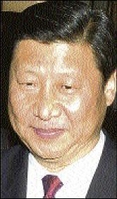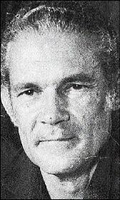Michael Manley: The spirit of 1969
Published: Sunday | February 22, 2009

It is often said that politicians have no vision. Like many things said about politicians, it is not true of all of them. Last week Jamaica welcomed the visit of China's vice-president, Xi Jinping, and his delegation. In January, both the Government and Opposition hailed the 50th anniversary of the Cuban Revolution from which we can now acknowledge important benefits.
In 2008, when oil prices hit record-high levels of US$147 a barrel, Jamaica survived because of the discount price agreement we enjoy with Venezuela under PetroCaribe.
Michael Manley was a visionary. His administrations, especially those of the 1970s, initiated diplomatic and/or political and economic relations with all three countries when it was not popular to do so. Manley was ahead of his time. Those times are now catching up. My friends tell me that Manley even envisioned nuclear power for Jamaica, more than 30 years ago, when the first oil price crisis undermined our economy and when we did not have Venezuela to help us.
manley's legacy
Our times give us cause to remember Michael Manley. The month of February gives us even more immediate cause. It was on February 9, 1969, 40 years ago, that he was elected president of the People's National Party (PNP). It was on February 9, 1989 that the PNP won elections and he became prime minister for the third time. Later this month, February 27, Delano Franklyn will launch his latest book, a collection of Michael Manley's speeches.
It is the greatest of irony that precisely because he was so far ahead of his time, Manley's politics was the cause of so much conflict, since the society and indeed the world, were so far behind. The distance between the two was a space that many exploited and used against him. Those who did not have the ability or interest to envision the future exploited ignorance of the future.
The fight for that future was such that the PNP thought the violence and propaganda behind its defeat in 1980 was due in part to its relations with Cuba. As for Venezuela, even as recently as 2005, the then Opposition rallied a national demonstration against the Government at a time when Venezuelan and Caribbean leaders were in Jamaica to discuss the PetroCaribe agreement. This is a legacy of the Manley-Perez accord that went back to 1980.
socialist administration
Only two years ago, the then Opposition had also questioned Jamaica's diplomatic arrangement with China, because it had been using premises that China paid for, even though China pays for a offices that many other countries use to help defray costs. Even the Spanish investments were criticised by the Jamaica Labour Party (JLP), even though the country is now reaping the benefits of a friendship cultivated with a socialist administration in Spain by Manley's legatees.
The future that Manley saw 40 years ago is here. In this future, the world economic system has so damaged itself that North-South dialogue is more important than ever, as is South-South cooperation, the very things Manley spent so much energy on during his fight for a new international economic order (NIEO). Now, we hear a spokesman from the Caribbean Policy Research Institute saying that the developing countries are going to be the ones to lead the developed countries out of recession.
This is not going to happen, if as is implied, the Western countries invest their stimulus money in the developing countries for higher rates of return because higher rates of return might only mean more business for them and continued exploitation of the developing world.
It is better for countries like China, India, Brazil, South Africa and their economic alliance systems to apply global reforms along the general lines of the NIEO to the world trading and financial system, as is now being mooted again, and indeed to the United Nation's system of global governance. It is for Jamaica to take advantage of strategic alliances with these blocs of nations in order one day to benefit from better rules and structures for trade and finance.
THE OLD WORLD
This is the work that Manley started so many years ago. But in order to inaugurate a new world, he had to defeat the old. So, he fought to end apartheid in South Africa alongside Cuba, a decision that led the Americans to decide, with local accomplices, to make the Jamaican economy 'scream'. No wonder Jamaica and Cuba were among the first countries that a grateful Nelson Mandel visited after he was released and when so many bandwagon countries wanted him to visit them instead.
Manley placed Jamaica alongside India as a leading voice in the Non-Aligned Movement to carve out an independent space between the 'Cold Warriors' and support anti-colonial movements. Manley tried to develop an alternative to the neo-liberal free trade of the Americas by envisioning an arrangement with Venezuela that can now claim to have inspired the PetroCaribe Agreement and even the Bolivarian Alternative of the Americas.
Manley led the Caribbean towards diplomatic relations with Cuba and attacked the Unitted States embargo. Now, the embargo's days are numbered as President Obama's Congress begins to discuss legislation to rescind that inhumane policy. As part of the North-South Dialogue in Socialist International, Michael Manley and German Chancellor Willy Brandt worked towards a document, published under the tile, Common Crisis. If ever a title was prophetic, it was that one. It warned against all the crises of today, from the food crisis to the environmental one, 25 years ago.
POLITICS AND EQUALITY
Delano Franklyn's book, to be launched at Mona Visitors' Lodge at the University of the West Indies on Friday coming, is entitled, Michael Manley - The Politics of Equality. The title is important. It brings out Manley's own passion for equality and makes him all the more relevant again. In recent years, the United Nations, the World Bank and the various scholars have been (re) turning their attention to the correlates between equity and development. The PNP itself has taken up this theme to make it the central idea of its new Progressive Agenda.
The basic argument is that human capital (the skills and talents of people) are the most important assets in development. Poverty and inequality amount to a massive waste of that capital. We must provide each with equal opportunity to develop his or her talent and release everyone's true potential. Many countries now spend trillions to stimulate economic capital, but have never spent enough to stimulate human capital.
Some chapter titles from Franklyn's book spell out Manley's own position. It assessed that even with
Robert Buddan lectures in the Department of Government, UWI, Mona. Email: Robert.Buddan@uwimona.edu.jm. Feedback may be sent to columns@gleanerjm.com.



Jinping, Manley and Franklyn
